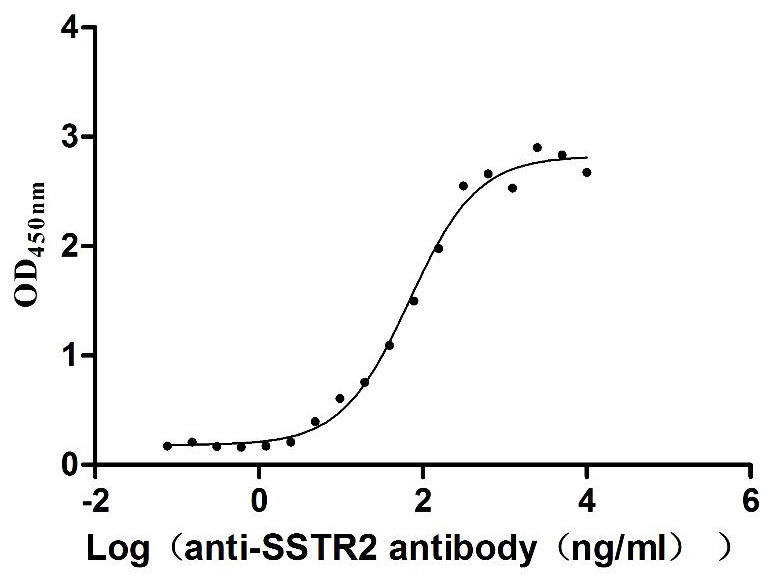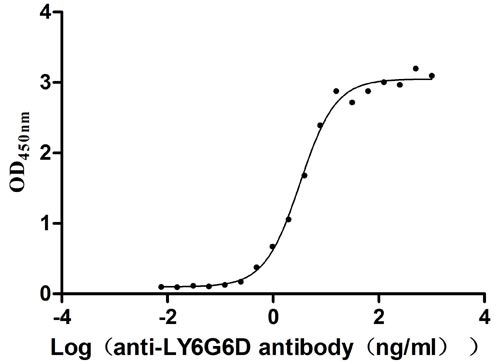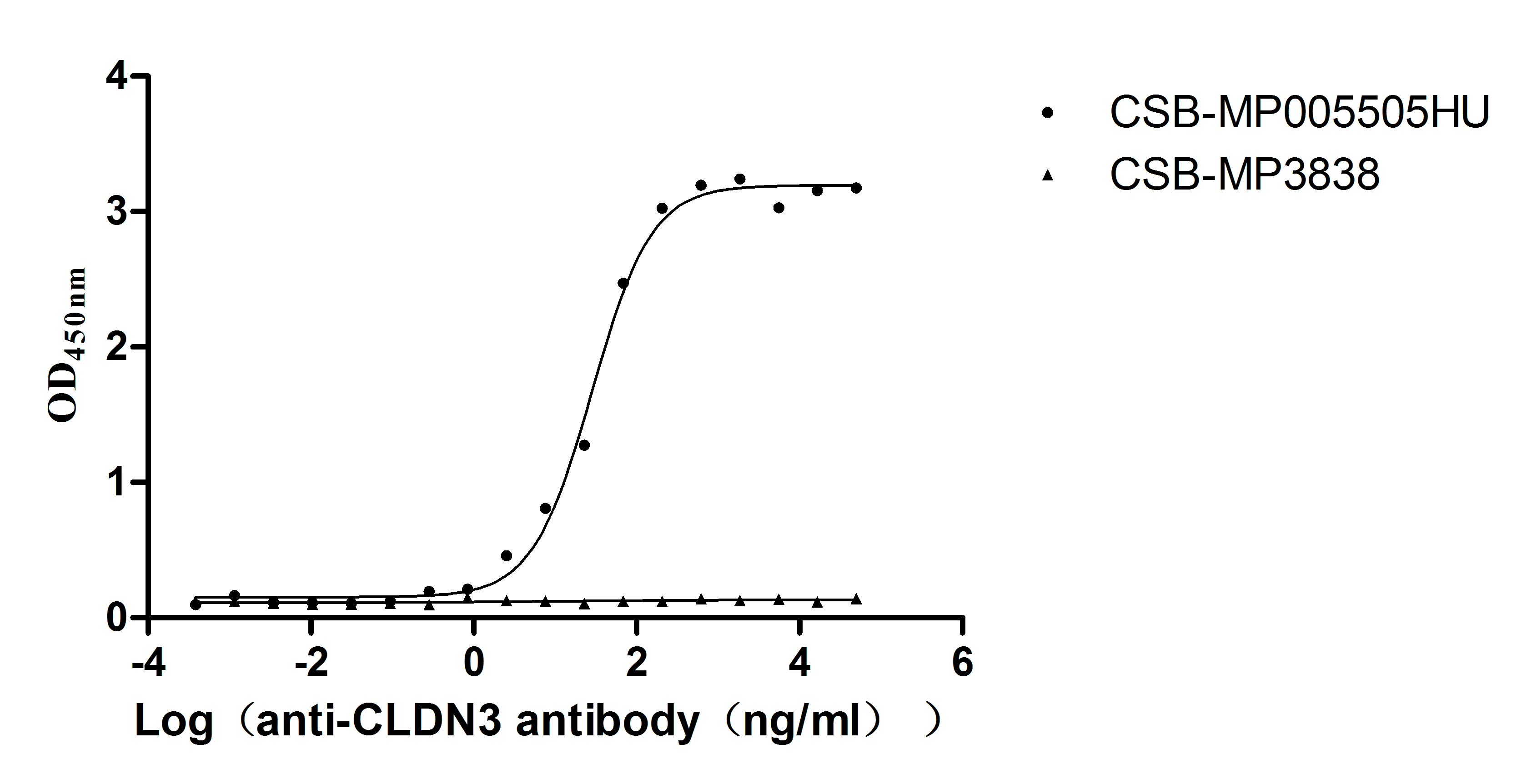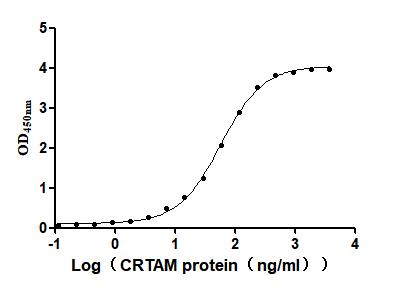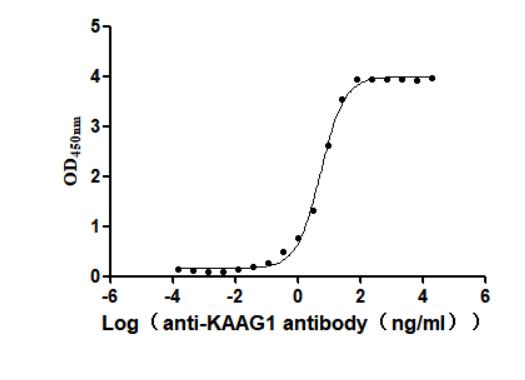Recombinant Human Baculoviral IAP repeat-containing protein 7 (BIRC7)
-
中文名称:Recombinant Human Baculoviral IAP repeat-containing protein 7(BIRC7),Yeast
-
货号:CSB-YP839300HU
-
规格:
-
来源:Yeast
-
其他:
-
中文名称:Recombinant Human Baculoviral IAP repeat-containing protein 7(BIRC7),Yeast
-
货号:CSB-EP839300HU
-
规格:
-
来源:E.coli
-
其他:
-
中文名称:Recombinant Human Baculoviral IAP repeat-containing protein 7(BIRC7),Yeast
-
货号:CSB-EP839300HU-B
-
规格:
-
来源:E.coli
-
共轭:Avi-tag Biotinylated
E. coli biotin ligase (BirA) is highly specific in covalently attaching biotin to the 15 amino acid AviTag peptide. This recombinant protein was biotinylated in vivo by AviTag-BirA technology, which method is BriA catalyzes amide linkage between the biotin and the specific lysine of the AviTag.
-
其他:
-
中文名称:Recombinant Human Baculoviral IAP repeat-containing protein 7(BIRC7),Yeast
-
货号:CSB-BP839300HU
-
规格:
-
来源:Baculovirus
-
其他:
-
中文名称:Recombinant Human Baculoviral IAP repeat-containing protein 7(BIRC7),Yeast
-
货号:CSB-MP839300HU
-
规格:
-
来源:Mammalian cell
-
其他:
产品详情
-
纯度:>85% (SDS-PAGE)
-
基因名:BIRC7
-
Uniprot No.:
-
别名:Baculoviral IAP repeat containing 7; Baculoviral IAP repeat containing protein 7; Baculoviral IAP repeat-containing protein 7; BIRC 7; birc7; BIRC7_HUMAN; KIAP; Kidney inhibitor of apoptosis protein; Livin; Livin inhibitor of apotosis; Melanoma inhibitor of apoptosis protein; ML IAP; ML-IAP; MLIAP; RING finger protein 50; RNF 50; RNF50
-
种属:Homo sapiens (Human)
-
蛋白长度:full length protein
-
表达区域:1-298
-
氨基酸序列MGPKDSAKCL HRGPQPSHWA AGDGPTQERC GPRSLGSPVL GLDTCRAWDH VDGQILGQLR PLTEEEEEEG AGATLSRGPA FPGMGSEELR LASFYDWPLT AEVPPELLAA AGFFHTGHQD KVRCFFCYGG LQSWKRGDDP WTEHAKWFPS CQFLLRSKGR DFVHSVQETH SQLLGSWDPW EEPEDAAPVA PSVPASGYPE LPTPRREVQS ESAQEPGGVS PAEAQRAWWV LEPPGARDVE AQLRRLQEER TCKVCLDRAV SIVFVPCGHL VCAECAPGLQ LCPICRAPVR SRVRTFLS
-
蛋白标签:Tag type will be determined during the manufacturing process.
The tag type will be determined during production process. If you have specified tag type, please tell us and we will develop the specified tag preferentially. -
产品提供形式:Lyophilized powder
Note: We will preferentially ship the format that we have in stock, however, if you have any special requirement for the format, please remark your requirement when placing the order, we will prepare according to your demand. -
复溶:We recommend that this vial be briefly centrifuged prior to opening to bring the contents to the bottom. Please reconstitute protein in deionized sterile water to a concentration of 0.1-1.0 mg/mL.We recommend to add 5-50% of glycerol (final concentration) and aliquot for long-term storage at -20℃/-80℃. Our default final concentration of glycerol is 50%. Customers could use it as reference.
-
储存条件:Store at -20°C/-80°C upon receipt, aliquoting is necessary for mutiple use. Avoid repeated freeze-thaw cycles.
-
保质期:The shelf life is related to many factors, storage state, buffer ingredients, storage temperature and the stability of the protein itself.
Generally, the shelf life of liquid form is 6 months at -20°C/-80°C. The shelf life of lyophilized form is 12 months at -20°C/-80°C. -
货期:Delivery time may differ from different purchasing way or location, please kindly consult your local distributors for specific delivery time.Note: All of our proteins are default shipped with normal blue ice packs, if you request to ship with dry ice, please communicate with us in advance and extra fees will be charged.
-
注意事项:Repeated freezing and thawing is not recommended. Store working aliquots at 4°C for up to one week.
-
Datasheet :Please contact us to get it.
相关产品
靶点详情
-
功能:Apoptotic regulator capable of exerting proapoptotic and anti-apoptotic activities and plays crucial roles in apoptosis, cell proliferation, and cell cycle control. Its anti-apoptotic activity is mediated through the inhibition of CASP3, CASP7 and CASP9, as well as by its E3 ubiquitin-protein ligase activity. As it is a weak caspase inhibitor, its anti-apoptotic activity is thought to be due to its ability to ubiquitinate DIABLO/SMAC targeting it for degradation thereby promoting cell survival. May contribute to caspase inhibition, by blocking t...显示更多
-
基因功能参考文献:
- The overexpression of PTEN concomitant with Livin gene silencing was confirmed as a feasible and effective in vitro and in vivo gene modulation method, which may represent a potential therapeutic strategy for the treatment of Gastric Cancer. PMID: 29436592
- Livin overexpression not only significantly inhibited RCC cell apoptosis and increased cell viability, but completely reversed the si-CCAT1-mediated repression of cell viability PMID: 28470345
- our results revealed that Livin induced EMT through the activation of the p38/GSK3beta pathway, which in turn promoted the progression and metastasis of breast cancer, especially for triple-negative breast cancer (TNBC) PMID: 29039608
- our results suggest that siRNA-mediated Livin knockdown enhanced the chemosensitivity of the three head and neck squamous cell carcinoma cell lines to cisplatin, 5-FU and docetaxel. PMID: 28440463
- Livin is specifically over-expressed in adrenocortical carcinoma. PMID: 28030838
- Further experiments confirmed the induction of cell apoptosis and suppression of cell proliferation by anti-MM scFv-tP in LiBr cells, along with efficient silence of Livin gene both in vitro and in vivo. Altogether, our findings provide a feasible approach to transport Livin small interfering RNA to malignant melanoma cells which would be a new therapeutic strategy for combating malignant melanoma PMID: 28459204
- MicroRNA-214 inhibits the osteogenic differentiation of human osteoblasts through the direct regulation of BIRC7. PMID: 28109866
- the results of the present study suggested that Livin may enhance tumorigenesis by modulating the mitogenactivated/Akt signaling pathways in human HSCC. PMID: 27175933
- Positive BIRC7 expression and negative KLF4 expression are associated with the progression of PDAC and poor prognosis in patients with PDAC. PMID: 27802195
- High expression of BIRC7 is associated with drug resistance in Renal cell carcinoma. PMID: 27677286
- Data show that cylindromatosis (CYLD) overexpression and livin knockdown might improve gemcitabine chemosensitivity by decreasing autophagy and increasing apoptosis in bladder cancer (BCa) cells. PMID: 27448305
- The apoptosisinducing effects of livin and surivin knockdown were investigated using a Hoechst staining kit. PMID: 26708654
- Expression of livin, survivin and caspase-3 are closely related to the occurrence and development of prostatic cancer. PMID: 26823716
- Our results suggested the important role of Livin and its partner molecule in the process of VSV treatment PMID: 26412467
- Data showed that Livin knock-down suppressed cell proliferation and inhibited cell invasion, accompanied by downregulation of VEGF and MMP-2/-9. Its silencing resulted in the prevention of xenograft tumor formation. PMID: 26094984
- These findings suggest that livin may be used as a novel target for tumor gene therapy. PMID: 25695324
- Upregulation of Livin expression and downregulation of caspase activity are observed under cycling and chronic hypoxia in glioblastoma cells and xenografts. PMID: 25370472
- Livin expression was higher in condyloma acuminatum than in normal cells and was correlated with survivin and Ki-67. PMID: 26122233
- Livin gene has a high expression in osteosarcoma and inhibits apoptosis in tumor tissue. PMID: 25374170
- livin is associated with invasive and oncogenic phenotypes such as tumor cell invasion, tumor cell migration, tumor cell proliferation, and resistance to apoptosis in human oral squamous cell carcinoma cells. PMID: 25242075
- These data suggest that livin overexpression plays an important role in tumor invasiveness by mediating resistance to apoptosis. PMID: 25339450
- effectively silence Livin gene expression in LoVo colon cancer cells, inhibit cell proliferation and colony formation, induce apoptosis, and enhance sensitivity to cisplatin PMID: 24938471
- In diagnostically difficult cases of diffuse large B-cell lymphoma and Hodgkin lymphoma, focus on livin as marker may provide useful corroborative information. PMID: 24767895
- Low livin expression is associated with childhood acute lymphoblastic leukemia. PMID: 24696218
- Co-silencing of Livin and Survivin can effectively inhibit the cell proliferation and apoptosis of lung cancer cells. PMID: 25261663
- Livin expression was not associated with survival in pancreas ductal adenocarcinoma. PMID: 25090821
- our findings indicate that the expression of Livin is increased in human GC and correlates with tumor differentiation and lymph node metastases PMID: 24220265
- The expression of Livin was was independently related to survival in rectal cancer patients PMID: 24295240
- Livin expression was positively correlated with the proliferation marker Ki-67, but was negatively correlated with caspase-3 expression in human ampullary carcinoma patients. PMID: 23343959
- Data suggest that Livin has a role in thrombopoiesis by regulating the apoptotic and antiapoptotic balance in MK endoreplication and platelet production. PMID: 24287698
- High livin expression is associated with lymph node micrometastasis in non-small cell lung cancer. PMID: 23404657
- no significant correlation was found between Livin expression and various clinicopathological parameters including survival. PMID: 24008725
- Livin is associated with tumor progression by increasing tumor cell motility and inhibiting apoptosis in colorectal cancer PMID: 24023847
- our data suggest that Livin is involved in tumorigenesis of human osteosarcoma and may serve as a promising therapeutic target for osteosarcoma. PMID: 23632777
- Livin interaction with caspase-3 and Livin role in the regulation of cell death PMID: 23563149
- BRG1 regulates ML-IAP expression by cooperating with MITF to promote transcriptionally permissive chromatin structure on the ML-IAP promoter. PMID: 23480510
- High BIRC7 expression is associated with lymph node metastasis in squamous cell/adenosquamous carcinomas and adenocarcinoma of gallbladder. PMID: 23906305
- Livin expression promotes breast cancer metastasis through the activation of AKT signaling and induction of EMT in breast cancer cells both in vitro and in vivo. PMID: 23524337
- Livin may inhibit apoptosis in cervical squamous cell carcinoma by downregulating caspase-3, thereby promoting disease progression. PMID: 23781587
- Genistein can suppress Livin gene expression, induce melanoma cell apoptosis, hinder the cell cycle, and restrain cell proliferation. PMID: 22931613
- Survivin and livin mRNA levels in patients with lung cancer were significantly higher than in those with benign lung disease. PMID: 22930255
- The increased expression of CD44v6 and Livin in gastric cancer tissue may be closely related with development and progression of gastric cancer. PMID: 22932199
- Overexpression of Livin led to cisplatin resistance in colon cancer. PMID: 23188704
- study demonstrated the expression of inhibitor of apoptosis proteins, survivin and Livin and the pro-apoptotic protein TSP-1 in endemic Burkitt lymphoma (BL); no significant difference was found between BL and reactive lymphoid hyperplasia PMID: 23030305
- Livin expression may be regulated by miR-198 in human prostate cancer cell lines. PMID: 23069480
- our data reveal a new, Livin-dependent, apoptotic role for TEAD1 in mammals and provide mechanistic insight downstream of TEAD1 deregulation in cancers. PMID: 23029054
- study concludes PTEN and Livin are important in renal clear cell carcinoma development PMID: 22938441
- data suggested that livin plays an important role in inhibiting the apoptosis of ovarian cancer cells PMID: 22766624
- Bortezomib and arsenic trioxide can induce apoptosis by inhibiting the expression of livin mRNA in Jurkat cells. PMID: 21867610
- Livin and survivin may be involved in the pathogenesis and progression of adult acute lymphoblastic leukemia. PMID: 21867615
收起更多
-
亚细胞定位:Nucleus. Cytoplasm. Golgi apparatus. Note=Nuclear, and in a filamentous pattern throughout the cytoplasm. Full-length livin is detected exclusively in the cytoplasm, whereas the truncated form (tLivin) is found in the peri-nuclear region with marked localization to the Golgi apparatus; the accumulation of tLivin in the nucleus shows positive correlation with the increase in apoptosis.
-
蛋白家族:IAP family
-
组织特异性:Isoform 1 and isoform 2 are expressed at very low levels or not detectable in most adult tissues. Detected in adult heart, placenta, lung, lymph node, spleen and ovary, and in several carcinoma cell lines. Isoform 2 is detected in fetal kidney, heart and
-
数据库链接:
HGNC: 13702
OMIM: 605737
KEGG: hsa:79444
STRING: 9606.ENSP00000217169
UniGene: Hs.256126


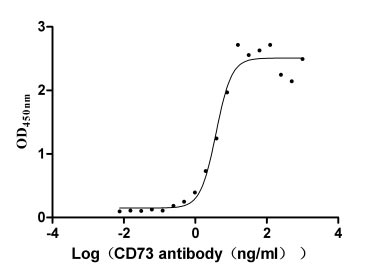
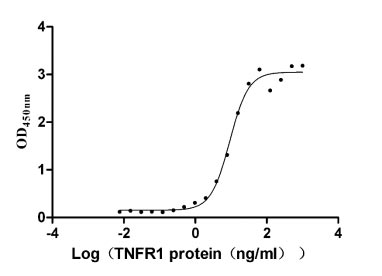
-AC1.jpg)
